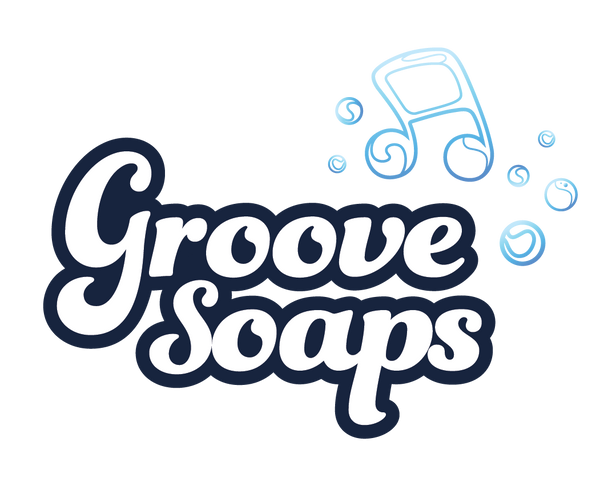
If you’re looking for a great gift to give to a teacher, hostess or for a work or club gift exchange, you might want to consider craft soap. Not only does it make a unique and appreciated gift that smells great, it also can do some good for your local area.
Here are five great reasons to try it:
You’re supporting a small business.
When you choose craft soaps, it’s likely that the producer is a small, local business that puts the money you spend back into the local economy.
When 2020 hit, the Orlando-area musicians behind Groove Soaps found the gigs nonexistent, and so a side gig came into full play: making soap.
Jason originally learned the art of soap making from his grandmother and has done it as a hobby for decades. In fact, he developed his own formula and techniques for homemade plant-based soaps to address his young daughter’s sensitive skin. As Jason explains, “I wanted to make a quality bar soap that was both safe for my daughter and the most sensitive skin, but still worked well for myself.”
Sharing this hobby with fellow musician Nas seemed natural when the two found themselves with no stages to play on due to the shutdown. In a time that seemed bleak, the idea of delivering the world clean soap was a small way to give back and deliver hope.
You’re getting a quality product.
Most of the time, handcrafted items like soaps are made in small batches, and much more individual attention is paid to details. We make the highest quality hand-crafted, plant-based soap using just six ingredients. Our process is a nod to the traditional soapmakers of times past. We believe today’s manufactured soap doesn’t have the same soul, so we prefer handcrafted soap making due to its pure art form.
You’re choosing a unique gift.
By giving craft soaps or other handcrafted items, you’re giving a gift that shows you appreciate individuality. These types of gifts are perfect for those one-of-a-kind friends and family members.

You’re giving a natural gift.
The natural ingredients in craft soaps will keep the skin nourishment intact and benefit your skin immensely. Whether you have dry skin or sensitive skin, using natural soaps is always better than going for chemical soaps. The ingredients used to make natural soaps have elements that prevent skin harshness and antioxidants as well.
Here are a rundown of the plant-based oils we use in our soaps and why they are good for your skin and the planet:
Coconut Oil
Coconut oil is made from the fruit of coconuts. To be more specific, it’s made from the white fleshy inner part of coconuts. Virgin or extra virgin coconut oil is made from the fresh flesh, while refined coconut oil generally uses copra, or dried flesh.
Coconut oil is made up of medium chain fatty acids which help to reduce dryness and allow your skin to retain moisture. It also provides a protective barrier, helping shield skin from environmental toxins, dirt, and other icky stuff you’re faced with everyday. With antioxidant and phytonutrient (plant compounds) components, coconut oil for the face can help boost your nutrient factor and fight against environmental stressors that accelerate signs of aging.
Sustainable Palm Oil
Palm oil is an edible vegetable oil that comes from the fruit of oil palm trees, the scientific name is Elaeis guineensis. Two types of oil can be produced; crude palm oil comes from squeezing the fleshy fruit, and palm kernel oil which comes from crushing the kernel, or the stone in the middle of the fruit.
Among the most beneficial skin care ingredients contained within palm oil is beta carotene. Beta carotene is a powerful antioxidant that kills off the free radicals that can lead to premature aging by destroying your body cells, including those of your skin. Palm oil is also a natural source of vitamins A, C, and E, which also have antioxidant properties. Palm oil is also a good moisturizer, and promotes smoother skin, as many natural skin care products do.
Canola Oil
Canola oil is a vegetable oil derived from a variety of rapeseed that is low in erucic acid, as opposed to colza oil. There are both edible and industrial forms produced from the seed of any of several cultivars of the plant family Brassicaceae.
Canola oil contains a high level of essential fatty acids, which moisturize the skin and enhance the strength of skin tissue. It's also rich in Vitamin K, which helps keep the skin supple and smooth, and linoleic acid, which forms a barrier on the skin to keep moisture from escaping.
Olive Oil
Olive oil is a nutrient-packed oil made from pressing olives and then expressing their oil. Olives are considered a soft fruit, much like peaches and plums. That means they can bruise easily, which affects the quality of the oil.
Olive oil is a pantry staple that is known for its health benefits in our diets, and it turns out it may be just as beneficial for our skin as well. Olive oil is rich in vitamins and antioxidants, and has been linked to improved skin moisturization, anti-aging effects, and relief from sun damage. Olive oil can be used on the skin, on its own, or as part of skincare products such as facial cleansers or lotions.
Castor Oil
Castor oil is a vegetable oil derived from the castor bean or Ricinus communis. Generally found in Eastern Africa, the Mediterranean Basin, and parts of Asia, the castor bean is also grown in tropical regions around the world. When pressed into oil, it has just a slightly yellow-ish color. Castor oil is produced by cold-pressing castor seeds and then applying heat. It’s not considered an edible oil, and makes up only a fraction of the world’s vegetable oil production.
Castor oil contains antioxidants that fight free radicals in your body. Free radicals are responsible for accelerating the aging process, making wrinkles appear sooner. Castor oil has anti-inflammatory properties, which can help reduce swelling and puffiness. It could reduce the size of inflamed pimples or eye bags as well.

Natural Essential Oils
All of our soaps contain only natural essential oils as the fragrance. An essential oil is a natural product extracted from a single plant species. Not all plants produce essential oils, and in the plants that do, the essential oil may be found in the roots, stems, leaves, flowers, or fruits. For example, our Florida Citrus Slab is infused with locally sourced orange peels and orange essential oils
Essential oils are all natural, they have medicinal and aromatherapy properties, and they do not contain nearly as many carcinogens and other toxins as do fragrance oils. Essential oils often have a greater depth and character than the more flat fragrance oils.
Natural Soap is Economical.
Some consumers are put off by the cost of handmade soap. You probably look at a bar of natural soap and wonder why it costs more. I mean, soap is soap, right? Both bars clean your skin, right?
Commercial soap companies do not want extra oils or glycerin in their soaps because they decrease shelf-life. Without these extra oils to moisturize your skin, you must reach for that bottle of lotion! So, although a bar of commercial soap may cost less, what happens to the cost once you add in the price of all of that cream and lotion (which is also filled with chemicals) that you need to slather all over your dry, itchy skin?

